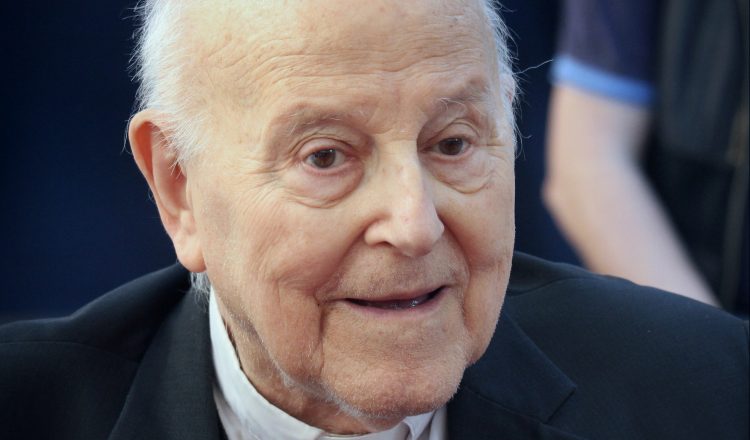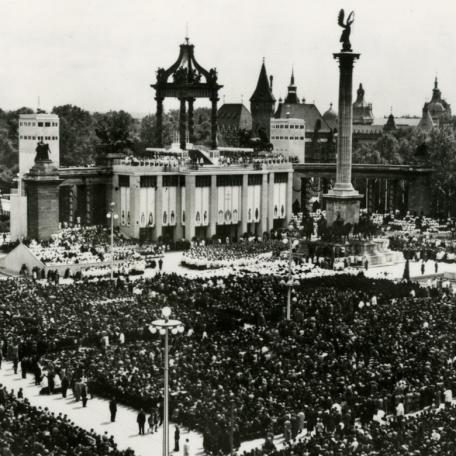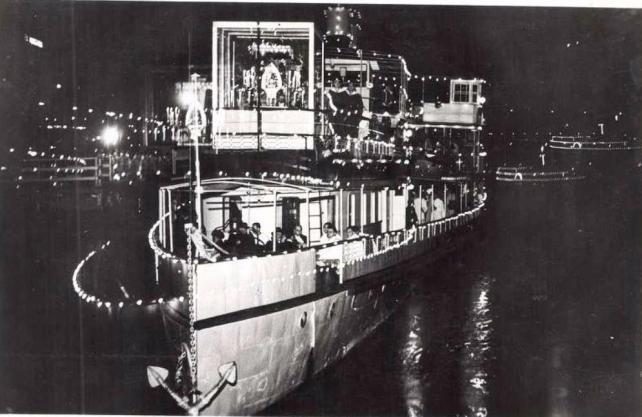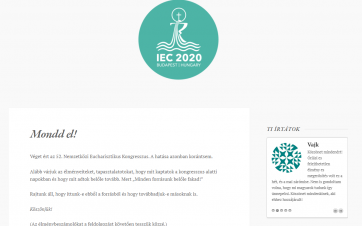
We felt as if there were a church in the middle of the Danube

Around twenty Hungrian religious remembered their childhood memories – one of them remembered when he was 5 years old, and one sister was preparing for her high school final exams in the May of 1938. Back in those days many of them lived far away from the capital and could listen to the events of the Congress only on radio, many others could personally participate in the festivities in Budapest. This gives us many different shades of the very same historical event.
In the first part of the series the Jesuit father, Péter Nemeshegyi tells his story, who remembers precisely the captivating events of 80 years ago.
“In 1938, I was 15 years old and there were great expectations for the International Eucharistic Congress. In the schools there were no preparations, because I went to a Lutheran high school. They weren’t hostile, but it wasn’t their feast.
They announced the Congress in our Churches and the newspaper Új Ember also wrote about it. They also encouraged us saying that everyone should do their best to decorate their houses. I made the Pope’s coat of arms out of paper – is wasn’t a piece of art – and put it onto our balcony.

At the different events – where I could – I participated. First of all, there was a huge Holy Mass in Heroes’ Square for the high school students. The altar was built between the columns of the Millennium Memorial, it was made of wood, if I remember correctly. The papal legate – who represented Pope Pius XI during the Congress – Eugenio Pacelli had a long, thin, ascetic figure which was impressive. That was the first time I saw him (later, as pope, he also was an impressing personality).
The lake in the City Park – I knew it very well, I lived nearby – was drained to create more space. So, during this mass both the lake and the square before the monument were full of students. There were innumerable communicants, I think it had never happened before, in Hungary, that so many students gathered and encountered the Lord.
Back then I was attending the Fasori Lutheran Gimnázium. They were recruiting members for the Rengum Marianum there too. My beloved mother died that year, after a long sickness. My spiritual father told me:
- Son, come to the Regnum, it will do you good!
From that time, I became a devoted scout.
As a Regnum–boyscout I was present at the men’s night adoration, held by the two Jesuits Elemér Csávossy and Béla Bangha. And then I heard Béla Bangha speak and later I read somewhere that he was already very sick and felt that he was going to die that year, but he was asked to be the Church leader of the Congress. Naturally there were others who did the organising, he was responsible for the spiritual part. And he dived into it with all his strength.
When that night during the contemplation he said the prayer he could only talk – because he felt the end of his life nearing – as if he were alone in a chapel talking to Jesus.
They said that so many men gathering around for communion was a miraculous thing, even in Hungary. Seeing this Béla Bangha whispered to one of his friends, prelate Zoltán Kiss, saying:
- My dear Zoltán, you know, we are living the most beautiful days of our lives.
He really would have loved laymen to play a more active role in the Church.
Anyway, I was selling the candles there. Before that I had sold them only to the women. It was more difficult with the men, they weren’t such enthusiastic buyers, despite the loudspeaker saying that one has to light a candle during the adoration, I had a couple of them left.

Another night there was a naval adoration, which I also attended, but not with the Regnum, but alone. The Eucharist was carried by a small steamer on the Danube; Cardinal Pacelli and many others were there and the ship was well lit. It went up the river, around Margaret Island, if I remember correctly. And we prayed along the banks of the Danube on both sides.
The closing ceremony of the whole Congress was a procession. It showed the old face of the Church. I did not participate in the procession but we had a flat in Lendvay street, near Andrássy boulevard and I watched from there as the procession passed. A watched it , the cardinals were especially imposing, wearing their cappa magnas, which were an at least four metres long thing and at its end two train-bearers helped the wearer move forward in it. The cardinals’ were usually scarlet. But then came Cardinal Jusztinián Serédi, his was black because he was a Benedictine; after him came the cardinal of Venice Adeodato Piazza, and he – being a Carmelite – wore white. And then arrived the dignitaries, Mrs. Horthy, too who was the main patroness of the Congress. she also participated in the procession.
According to plans the procession ended in the Heroes’ Square with a sacramental blessing, but I saw the dark clouds gathering in the sky. Well, what shall I say, I confess, I was a bit cowardly and thought “well, it is beautiful to wait until this beautiful procession passes, but it is safer to run home.” So, I ran, and got home just before the shower. The result was that the men in their cappa magnas got soaked to the skin, so the worldly magnificence seemed to be in question.
This was the whole world’s homage to the Lord Jesus Christ, Lord of All, Christ the King. In the world of politics big clouds were also gathering, one year later World War II started. We could sense this already during the Congress, because Hitler was already in power and he forbade the German Catholics to participate in the Congress.
In May 1938, all was beautiful, but this was the last big event of Catholic Hungary and also of the Catholic world. For the last time the pomp of the Church of the old times appeared, but the clouds of storm were already gathering…. we could feel this as students.
The Jesuit, Béla Bangha wrote the lyrics of the hymn, which is sung even today: “Sing of Christ, you all, who love Him, greet the King of Kings today.” and the mood is also greatly expressed in it: “Let your voices chant the great hymn in your homes and far away. North and South where Christians labour, join hands with East and West, Bend your knees with zeal and fervour, and for Christ's love heave your breast. Oh, adorable Redemptor, Jesus in the Eucharist, Bless this earth with peace and honour, bring us to Thy holy tryst.”
That is what we sung with great zeal.
Partner in conversation: Regina Bencze SSND/MSZKI
Source: szerzetesek.hu










